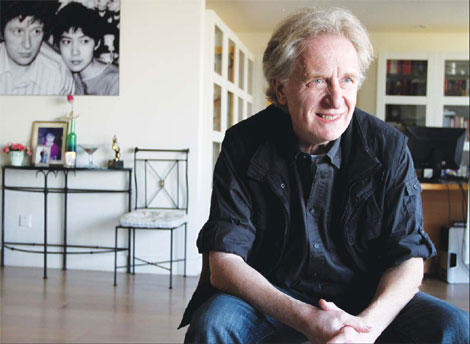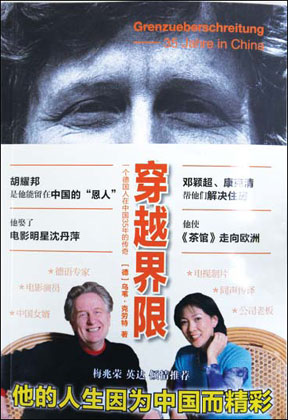Ringside view
Updated: 2010-12-10 13:17
By Chitralekha Basu (China Daily European Weekly)
|
|||||||||||
 |
|
Uwe Kraeuter, who has lived in China since 1974, says he is married to |
 |
| Kraeuter's book recounts his life in China. Cui Meng / China Daily |
After 35 years in China, German Uwe Kraeuter's book a 'small attempt to brush cobwebs off cliched ideas and prejudices' about China
As a child growing up in Hitzacker (Elbe), West Germany, in the 1950s, Uwe Kraeuter would hear enchanting stories about Shanghai - a city his sailor grandfather had passed by on his way to Japan. A deep mystical connection must have formed between the young German and the land that his folks often said was "further away from the moon".
In July 1974, Kraeuter landed up on Chinese shores. He has been here ever since.
Any foreigner who has lived in China for the past 36 years - and there aren't that many of them - has seen too many momentous events and dramatic reversals - from community kitchens to de-collectivization of agricultural produce, from the spontaneous nationwide mourning at the passing away of legendary figures such as Zhou Enlai and Mao Zedong to the extravaganza of the Beijing Olympics that stunned the world.
While there are hundreds of books on the outsider purporting to unravel the China "enigma", Kraeuter's Grenzueberschreitung - 35 Jahre in China (Crossing the Border), published in Gong Yingxing's Chinese translation by the China Youth Publishing House in October, stands out.
After all, Kraeuter reached certain milestones well before it became commonplace for other foreigners to do so.
"I am probably the European who has lived here continuously for the longest time. I did a lot of firsts for a foreigner: Facilitated cultural exchanges between China and Germany, started the trend of simultaneous translation, married a Chinese actress," Kraeuter says.
The actress is Shen Danping, whom Kraeuter met almost by mischance. His friend, the movie director Ling Zifeng, invited a young actress, Liu Feng, to an evening with Kraeuter. Liu, who did not want to come alone, brought along her roommate, Shen.
Shen's glowing smile and boyish charm - still fresh after 25 years of marriage - was an instant hit with Kraeuter. It was primarily the Oriental mystique about Shen that attracted him, says Kraeuter, - a mystery that still endures. The romance, expectedly heady, was thwarted somewhat when the two applied for a marriage license.
"The Chinese leadership was not too keen to have foreigners marrying Chinese girls. Shen was a well-known actress. So her marrying outside the community would have set a precedent," Kraeuter says.
"But I was never a foreigner to Shen. I had already lived here for 10 years and spoke Chinese," he adds. Kraeuter had, by that time, adapted to the Chinese way of courting a girl he was serious about.
Their two children, Elizabeth, 24, who works in the hospitality industry near Nanjing and Anna, 14, not surprisingly, have grown up imbibing the culture and values of both worlds.
"They are Chinese in terms of sensibilities but admire the West, having been there several times," Kraeuter says.
Photographs of the winsome foursome hang on the walls of their cozy apartment, to the west of Chaoyang Park in Beijing, alongside a quirky portrait of Kraeuter, painted by renowned Chinese artist Huang Yongyu. In it Kraeuter resembles a one-eyed owl.
Huang was among Kraeuter's big circle of friends persecuted during the "cultural revolution" (1966-1976). Cao Yu, playwright and former director of Beijing People's Art Theater, Yang Xianyi, who translated The Dream of Red Mansions into English; actor Zhao Dan; and film director Ling Zifeng were pulled up for offending the establishment in some way or the other.
Once he heard first-person accounts of the gagging of artists and writers, Kraeuter's initial euphoria about the success of socialism in China gave way to skepticism.
When he arrived in Beijing to work as an editor with the Foreign Languages Press in 1974, soon after having participated in a demonstration against former US defense secretary Robert McNamara - commonly perceived as the chief architect of the American attack on Vietnam - Kraeuter was moved by what the Communist leadership had achieved for their people.
"I did not see any poverty here," he says.
"I got the real story from my artist friends, who suffered immensely during the 'cultural revolution'," Kraeuter says.
But he wasn't prepared for the excesses that the socialist system generated in its wake, "the fact that it came to be guided by a faction with the aim of strengthening their own position and power".
But that was then. "China has progressed more than any other country in the past 30 years, including in the area of human rights," Kraeuter says. "We should not analyze and judge China from Western perspectives of development, see our own politics as naturally the best in the world and therefore one that should be universally accepted."
His book is a small attempt at brushing the cobwebs off the clichd ideas and prejudices traditionally held against China.
He now works as an independent filmmaker, producing and directing TV series and documentary features. In between, he has dabbled in simultaneous translation, was instrumental in taking a stage production of Lao She's Teahouse to Germany, has worked as a TV producer, presenter and actor and been a facilitator for cultural exchanges between the two countries.
Life has become a bit more relaxed since he moved to his present address. He loves the landscaped garden and sinuous architecture of his new home, besides, of course, the access to amenities.
"Finally, I can walk rather than having to drive in Beijing. I can just hop across to Sanlitun, the Kempinski Hotel or Chaoyang Park."
When he does go out for a spin it's in a Mercedes Benz. It's always been that way. The car of German make "is kind of an anchor". Living in Beijing is beautiful for this silver-haired man who has spent the better part of his life building cultural bridges but "you still need a bit of your background" to sustain that flow, he says.
He is still 100 percent German. "But I'm definitely more than a visitor in China. You could even say I'm married to China," Kraeuter says, suddenly cheerful about the double entendre he has just made. He hastens to add that as a foreigner one can never really belong to a country one has made his home.
In his book he writes about this sense of detachment. "But this loneliness is healthy as it keeps you mentally alert," Kraeuter explains. "You can never stop thinking about and comparing the two cultures you live between."
He is glad about the dual cultural experience that has enriched his life. "I totally enjoy being different in China," he says. After 35 years, China has not exhausted its storehouse of magic and mystery that Kraeuter had heard about from his grandfather more than half a century ago.
Li Lianxing contributed to this story.











